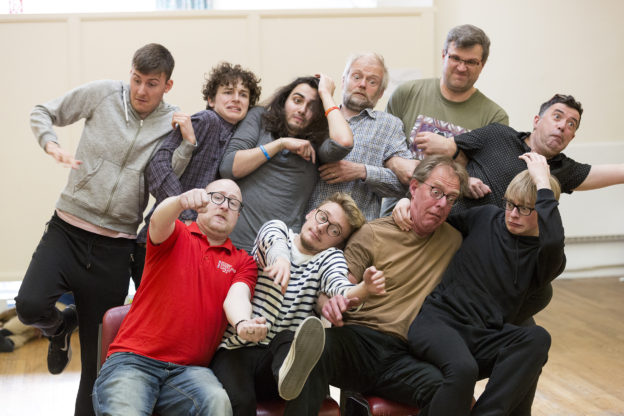This is Part 3 of a series documenting and analyzing the process of producing an original improvised theatre performance.
Rehearsals are ruined by indecision and inaction. Try it, decide, move on.
Rehearsal schedules vary depending on the cast, familiarity with the form or structure, and cast size. This article focuses on an 8, 2-hour rehearsal sessions of a brand new show with a fresh cast. To that end, the rehearsal schedule should be broken into three main phases:
- Discover and finalize the structural elements of the form from beginning to end.
- Practice the form with direct, immediate feedback on the improvisation itself.
- Polish the overall feel of the show as all elements come together.
The length of each phase varies based mostly on the length of time #1 takes, but it’s important to make time to accomplish all three parts of the show. What happens too often is that the final phase, #3, is left until the final dress rehearsal or even the first public show. This is a mistake that can lead to frustration for a new director.
If you’ve figured out what you want aesthetically in the show, that has to be part of it the whole way.Lucky Johnston, Director, “Isn’t It Too Dreamy”
The cast, regardless of their experience, are looking to you for the final decision. That doesn’t mean you need to be closed to ideas; you can encourage the cast during the first phase to speak up if they have an idea about something that would look/feel/be better than what you had been doing. The best response to that is, “Let’s try it.” It costs only a few minutes, but the easiest way to know if something works or doesn’t is to see it play out and the answer will usually be pretty clear to you and your cast. If it is not clear, make the decision. Don’t waste rehearsal time debating; if you can’t make the decision now, take a note for yourself and move forward in rehearsal. Time has value.
Don’t Be Afraid to Ask for Help
Like many first time directors, you will likely seek outside advice on struggles you are having or advice on planning the show (that’s why I assume you’re reading this article). Be aware that you don’t have to limit your ask to simple advice. The strength of any great leader, whether a director, general, or CEO is the ability to surround yourself with people who can be experts in areas where you are weak or less experienced.
For Three Minute Fiction I recruited the assistance of two other improvisers whom I and others I had played with respected for their ability to coach improvisers in a direct and helpful way. Each guest coach was given a full rehearsal to dive into the choices and scenes my cast was making with such expertise that I could match it with twice the time.
Side Note: Say thank you to those whom you reach out to, commiserate with the ask. In my case, the guest coaches were treated to the beverage of their choice at the start of rehearsal. Small gesture, but full of gratitude.
Doing a lot more side coaching, being a lot more direct with notes… improving my communication is something I would keep in mind.Lucky Johnston, Director, “Isn’t It Too Dreamy”
Two final pieces of advice for the rehearsal: plan and inform. The former will be the next post in this series. The latter, inform, is a reminder to share with your cast prior to rehearsal any notes, goals, or other information that is simple one-way communication. This saves you from eating up valuable rehearsal time. Whether that be done through email, group SMS, or a private Facebook group, have your cast buy-in to the communication method early and use it to keep them informed about what to expect and what you expect from them.
Featured Image: keystone kops by James Drury (CC-BY-ND)
